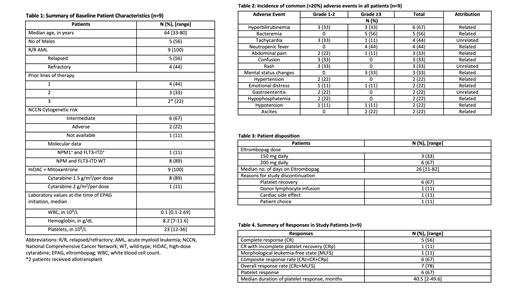Abstract
Background: Thrombocytopenia is prevalent at presentation and following induction chemotherapy (chemo) regimens in patients (pts) with newly diagnosed and relapsed/refractory (R/R) acute myeloid leukemia (AML). Eltrombopag (EPAG), oral, nonpeptide thrombopoietin (TPO)-receptor agonist, is currently approved for treatment of chronic immune thrombocytopenia, hepatitis-associated thrombocytopenia, and aplastic anemia. It has also been evaluated as a strategy to mitigate chemo-induced thrombocytopenia in pts with solid tumors, myelodysplastic syndrome, and following allotransplant. Prior studies have demonstrated that EPAG can directly inhibit the proliferation of human AML cells in vitro. Although EPAG has been studied following induction and consolidation chemo in the frontline AML setting, to date, the tolerability and efficacy of EPAG in pts receiving salvage chemo for R/R AML is not known.
Objectives: This study's objectives were to (a) estimate the maximum tolerated dose (MTD) and tolerability of EPAG, (b) examine platelet (plt) response (defined as plt count ≥ 100 x 10 9/L), and (c) anti-leukemic activity of EPAG in pts receiving high dose cytarabine (HiDAC) and mitoxantrone (Mito) for R/R AML.
Methods: In this phase I open-label study, adult pts (³ 18 yrs) with R/R AML with adequate organ functions and grade 4 thrombocytopenia following HiDAC (given every 12 hrs (3 g/m 2 for age < 50; 1.5 g/m 2 for age ≥50) for 12 doses) and Mito (dosed at 12 mg/m 2 x 3 doses every other day) were eligible. All pts must have had marrow hypoplasia demonstrated on Day 14 ± 3 days from the initiation of HiDAC. EPAG was started daily on Day 14 ± 3 days with dose determined using a standard '3+3' dose-escalation design. EPAG was discontinued if an adequate plt response was achieved or following 9 weeks of therapy. The dose-limiting toxicity (DLT) window was defined as the first 15 days of EPAG dosing.
Results: Nine pts with R/R AML were enrolled (Table 1). Median age was 64 yrs (range, 33-80), and 5 pts were men. All pts had intermediate (6/9, 67%), adverse (2/9, 22%), or unknown (1/9, 11%) cytogenetic risk disease. One (1/9) pt had NPM1+FLT3-ITD+ disease. Five pts (56%) had relapsed disease (2pts had prior allotransplant). All pts received HiDAC+Mito chemo and started on EPAG on Day 14 ± 3 days. Three received EPAG 150 mg, and 6 pts received 200 mg daily. The median duration on EPAG was 26 days (range, 11-82). One pt experienced a DLT of grade 3 myocardial ischemia while receiving EPAG 200 mg/day and was taken off study. No other DLTs were reported, and no MTD was determined. The most frequent grade ³3 adverse events (AEs, Table 2): were bacteremia (56%), neutropenic fever (44%), and hyperbilirubinemia (33%). Similarly, common grade 1-2 AEs consisted of hyperbilirubinemia, tachycardia, and confusion (33% each, respectively). At a median follow-up of 30.3 months (mo), all 9 pts had discontinued EPAG. Six pts (67%) achieved plt response (3 each in 150 mg and 200 mg/day dose level). The median time to achieve plt response and the duration of plt response was 27 days (range, 14-41) and 40.5 mo (range, 2-49.6), respectively. Three other pts discontinued EPAG therapy: 1 each due to cardiac ischemia, donor lymphocyte infusion, and patient choice, respectively (Table 3). Of note, 7/9 pts (78%) had clinical response: CR in 5 (56%), CRc (CR+CRp) in 6 (67%), MLFS in 1 (11%, Table 4). Two (2/7 responders) went on to subsequent allotransplant, and 6 died; 2-progressive disease, one each from pneumonia, failure to thrive, encephalopathy, and unknown cause, respectively. Among the 6 pts who achieved plt recovery on EPAG, 5 achieved CR and 1-MLFS following HiDAC+Mito.
Conclusion: This phase 1 dose-finding study demonstrated that EPAG 150-200 mg daily following HiDAC+Mito chemo for R/R AML was well tolerated with one DLT of cardiac ischemia (200 mg dose). Two-thirds (67%) of pts achieved plt recovery on EPAG after a median of 27 days (range, 14-41). In these small number of pts (n=9), addition of EPAG therapy did not seem to adversely affect clinical outcomes (CRc 67%) and may have contributed to long-term platelet recovery. Further studies are required to determine the optimal schedule and potential benefit of EPAG added to chemo regimens for R/R AML.
Przespolewski: Jazz: Research Funding. Griffiths: Celgene/Bristol-Myers Squibb: Consultancy, Honoraria, Research Funding; Apellis Pharmaceuticals: Research Funding; Alexion Pharmaceuticals: Consultancy, Research Funding; Astex Pharmaceuticals: Honoraria, Research Funding; Genentech: Research Funding; Taiho Oncology: Consultancy, Honoraria; Boston Biomedical: Consultancy; Takeda Oncology: Consultancy, Honoraria; Abbvie: Consultancy, Honoraria; Novartis: Honoraria. Thompson: Novartis/ Bristol-Myers Squibb: Research Funding. Elshoury: Bristol Meyers Squibb: Other: advisory board. Wang: Astellas: Consultancy, Membership on an entity's Board of Directors or advisory committees; Novartis: Consultancy, Honoraria, Other: Advisory Board; AbbVie: Consultancy, Membership on an entity's Board of Directors or advisory committees; GlaxoSmithKline: Consultancy, Honoraria, Other: Advisory Board; Kura Oncology: Consultancy, Honoraria, Other: Advisory board, steering committee, Speakers Bureau; Genentech: Membership on an entity's Board of Directors or advisory committees; BMS/Celgene: Membership on an entity's Board of Directors or advisory committees; Mana Therapeutics: Consultancy, Honoraria; Jazz Pharmaceuticals: Consultancy, Honoraria, Other: Advisory Board; Kite Pharmaceuticals: Consultancy, Honoraria, Other: Advisory Board; Pfizer: Consultancy, Honoraria, Other: Advisory Board, Speakers Bureau; Stemline Therapeutics: Consultancy, Honoraria, Other: Advisory board, Speakers Bureau; Takeda: Consultancy, Honoraria, Other: Advisory board; DAVA Oncology: Consultancy, Speakers Bureau; Rafael Pharmaceuticals: Other: Data safety monitoring committee; Gilead: Consultancy, Honoraria, Other: Advisory board; Daiichi Sankyo: Consultancy, Honoraria, Other: Advisory board; PTC Therapeutics: Consultancy, Honoraria, Other: Advisory board; Genentech: Consultancy; MacroGenics: Consultancy.


This feature is available to Subscribers Only
Sign In or Create an Account Close Modal